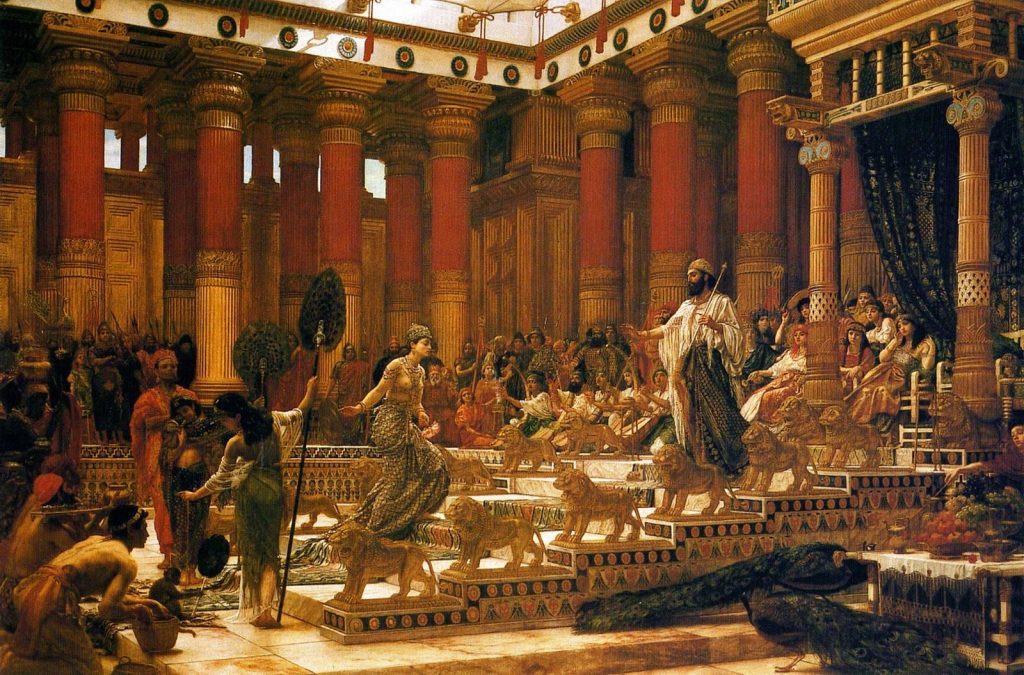
Jesus has accused the Pharisees and teachers of the law of leading a wicked and adulterous generation. To drive home His point, He used the example of Nineveh. The people of Nineveh had repented when Jonah preached to them. But now someone far, far greater than Jonah was present, and yet the people were rejecting Him. Jesus summarizes that tragic reality with a prophetic word, “The Queen of the South will rise at the judgment with this generation and condemn it; for she came from the ends of the earth to listen to Solomon’s wisdom, and now one greater than Solomon is here.”
The Pharisees and teachers of the law could not miss that point. They well knew what 1Kings 10 records, “When the queen of Sheba heard about the fame of Solomon and his relation to the name of the Lord, she came to test him with hard questions. Arriving at Jerusalem with a very great caravan—with camels carrying spices, large quantities of gold, and precious stones—she came to Solomon and talked with him about all that she had on her mind. Solomon answered all her questions; nothing was too hard for the king to explain to her. When the queen of Sheba saw all the wisdom of Solomon and the palace he had built, the food on his table, the seating of his officials, the attending servants in their robes, his cupbearers, and the burnt offerings he made at the temple of the Lord, she was overwhelmed.
She said to the king, “The report I heard in my own country about your achievements and your wisdom is true. But I did not believe these things until I came and saw with my own eyes. Indeed, not even half was told me; in wisdom and wealth you have far exceeded the report I heard. How happy your men must be! How happy your officials, who continually stand before you and hear your wisdom! Praise be to the Lord your God, who has delighted in you and placed you on the throne of Israel. Because of the Lord’s eternal love for Israel, he has made you king, to maintain justice and righteousness.”
Even the spiritually blind Pharisees would’ve made a series of realizations from that Scripture. Firstly, that the Queen of Sheba had heard of Solomon and came to grill him with questions, just as the Pharisees had heard of Jesus and came to ask Him questions. Solomon had answered the Queen’s questions astutely, just as Jesus had answered the Pharisees.
Secondly, the Queen had seen Solomon’s greatness through the success he had as king, just as the Pharisees had seen Jesus’ success through the healings and deliverances He had done.
It is the last point that sticks. The Queen had come to the reasonable conclusion that Solomon was surely blessed of God. All that she had heard was true, and she gave God glory. But on that point the analogy with the Pharisees breaks down. For they did not come to a reasonable conclusion as the Queen had. They did not praise God for His blessing or for what He had done or was doing as the Queen had done.
They instead rejected what they saw and heard. They rejected Jesus and aligned themselves with God’s enemy. Subsequently, the Queen will one day look at that generation and condemn it for having so obviously made not just a poor decision, but an overtly foolish one.
Psalm 34 exhorts God’s people, “Oh, taste and see that the Lord is good!” Those who look for God find Him, and find that He is good. But those who look only to justify themselves find nothing but fault.
The pure in heart shall see God; but those who are in love with evil cannot see the fulness of the Godhead dwelling bodily in Jesus. They guess, and reason, and blunder. Jesus is to them a stone of stumbling, and a rock of offence.
Charles Spurgeon
APPLICATION: Thankfulness
Praise God that He allows all who look to find Him. Will we recognize Him and give Him praise for who He is and what He has done? It is up to us to see what history will one day see as obvious!

